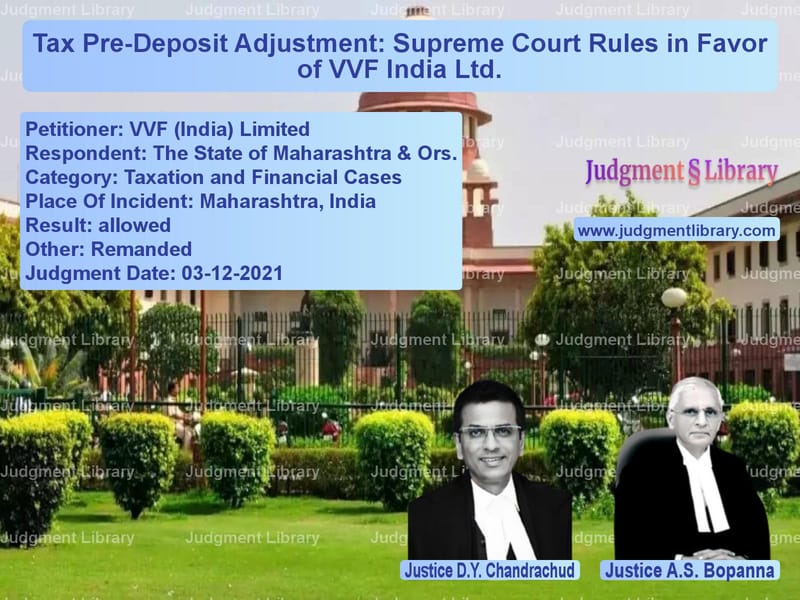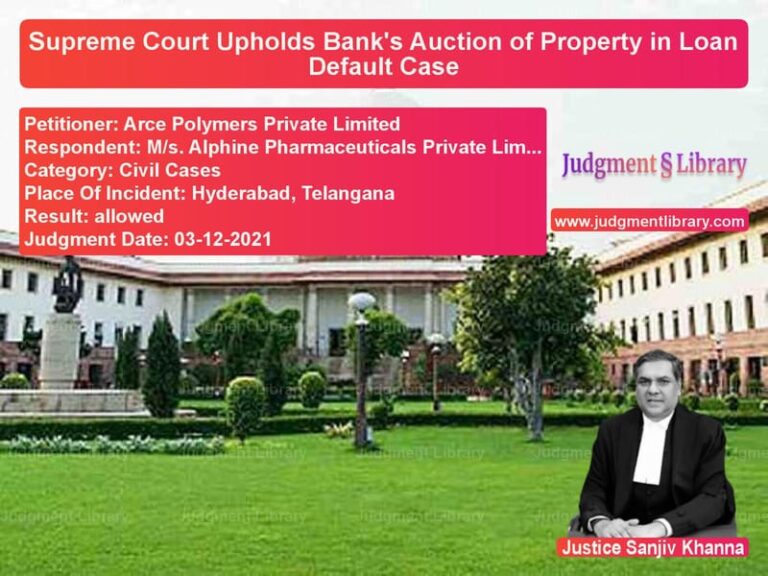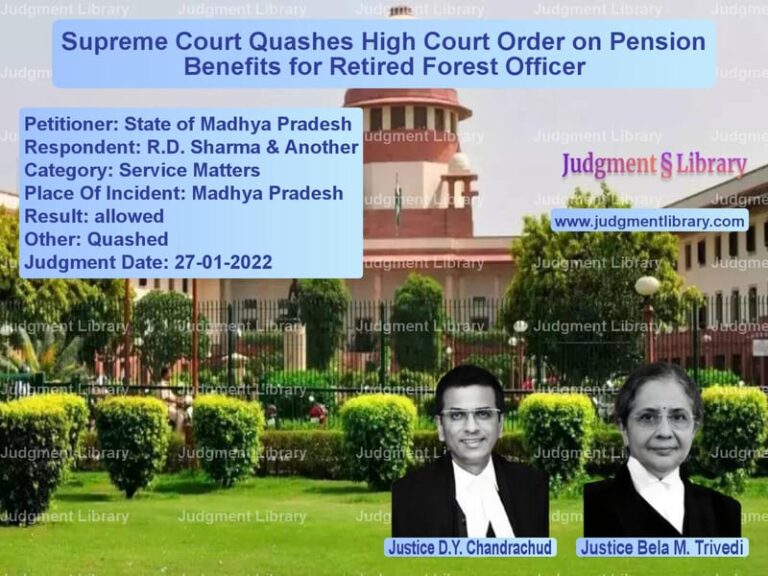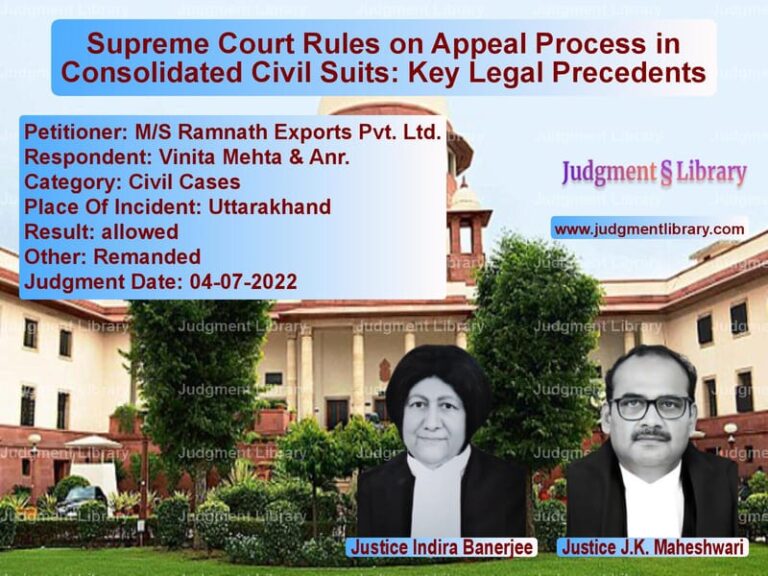Tax Pre-Deposit Adjustment: Supreme Court Rules in Favor of VVF India Ltd.
The Supreme Court of India recently delivered an important judgment in the case of VVF (India) Limited vs. The State of Maharashtra & Ors., addressing the issue of whether a payment made under protest before an assessment order can be adjusted against the mandatory pre-deposit required for filing an appeal under the Maharashtra Value Added Tax Act, 2002 (MVAT Act). The Court ruled in favor of VVF India Ltd., allowing such adjustments and overturning the decision of the Bombay High Court.
Background of the Case
VVF (India) Limited, a company engaged in the manufacture and sale of oleo-chemicals and personal care products, was subject to an investigation by the Maharashtra Sales Tax Department between November 15, 2016, and November 22, 2016. Following the investigation, the department issued a show cause notice on November 22, 2016, alleging tax liabilities against the company.
VVF India Ltd. contested the tax claims but made a protest payment of ₹3,64,24,388 between December 8, 2016, and January 11, 2017. This amount included ₹2,32,37,249 towards tax and ₹1,31,87,139 towards interest for the 2013-14 assessment year. Later, on December 26, 2017, an assessment order under the Maharashtra Tax on the Entry of Goods into Local Areas Act, 2002 was issued, imposing a tax demand of ₹10,44,54,708, along with an equal penalty and an interest demand of ₹7,09,06,928, bringing the total liability to ₹27,98,36,344.
VVF India Ltd. filed an appeal against the assessment order but was informed by the Joint Commissioner of Sales Tax through a letter dated June 4, 2018 that the payments made under protest could not be considered as part of the pre-deposit required under Section 26(6A) of the MVAT Act. The company challenged this decision in the Bombay High Court, which ruled against them on November 8, 2019. Aggrieved, VVF India Ltd. approached the Supreme Court.
Petitioner’s Arguments
VVF India Ltd., represented by senior counsel, presented the following arguments:
- Under Section 26(6A) of the MVAT Act, a taxpayer filing an appeal is required to deposit 10% of the disputed tax amount as a pre-condition for the appeal.
- The law does not explicitly state that the 10% deposit must be paid separately; rather, it requires a taxpayer to show proof of payment of the disputed tax.
- The entire tax assessment was disputed, so 10% of the total assessed tax should be counted, and the payments made under protest should be considered towards this requirement.
- A strict interpretation of a taxing statute is required, and the law should not infer an additional burden where none is explicitly imposed.
Respondent’s Arguments
The State of Maharashtra and its legal representatives argued:
- The mandatory pre-deposit applies only after the assessment order is issued, meaning payments made before assessment (even under protest) should not be counted.
- The appeal process under the MVAT Act is distinct from voluntary payments made under protest before assessment.
- The taxpayer was required to deposit 10% of the post-assessment demand rather than rely on prior payments.
- The High Court had correctly ruled that prior protest payments could not be counted towards the statutory pre-deposit.
Supreme Court’s Observations
The Supreme Court examined the language of Section 26(6A) of the MVAT Act and made the following key observations:
1. Statutory Interpretation Must Be Strict
The Court emphasized the importance of strict statutory interpretation in tax cases:
“A taxing statute must be construed strictly and literally. There is no room for intendment.”
The Court referenced the A.V. Fernandez v. State of Kerala (1957) case, which held that if a provision does not explicitly impose a burden, it cannot be inferred.
2. Pre-Deposit Requirements Do Not Exclude Previous Payments
The Court noted that Section 26(6A) requires taxpayers to deposit “10% of the disputed tax,” but it does not state that prior payments cannot be adjusted.
“The amount which has been deposited by the appellant anterior to the order of assessment cannot be excluded from consideration, in the absence of statutory language to that effect.”
3. High Court’s Reasoning Was Erroneous
The Court rejected the Bombay High Court’s reasoning that post-assessment payments alone qualify for the pre-deposit requirement:
“The High Court erred in holding that payments made under protest prior to assessment should be excluded from pre-deposit calculations.”
4. Payments Were Already Credited Against Tax Liability
The Court pointed out that the Maharashtra tax authorities had already credited the protest payments towards the total tax demand, which further justified their consideration as part of the pre-deposit requirement.
Supreme Court’s Verdict
The Supreme Court ruled in favor of VVF India Ltd. and:
- Allowed the appeal, overturning the Bombay High Court’s judgment.
- Declared that prior protest payments can be counted towards the 10% pre-deposit requirement under Section 26(6A) of the MVAT Act.
- Directed the Maharashtra tax authorities to restore the company’s appeal before the appellate authority.
- Instructed the appellate authority to verify that 10% of the disputed tax amount had been duly deposited, considering the protest payments.
Implications of the Judgment
This judgment has important implications for businesses and tax authorities:
- Clarification on Pre-Deposit Rules: Taxpayers can now rely on pre-assessment payments towards mandatory pre-deposit requirements.
- Protection Against Unnecessary Financial Burden: Companies will not have to make redundant payments when appealing tax assessments.
- Precedent for Future Cases: The ruling establishes that tax laws must be strictly interpreted, preventing arbitrary financial demands.
- Guidance for Tax Authorities: Tax officials must recognize legitimate prior payments rather than insisting on additional deposits.
This decision reaffirms that procedural tax burdens cannot be imposed beyond what is explicitly mandated by law, providing relief to businesses facing tax disputes.
Petitioner Name: VVF (India) Limited.Respondent Name: The State of Maharashtra & Ors..Judgment By: Justice D.Y. Chandrachud, Justice A.S. Bopanna.Place Of Incident: Maharashtra, India.Judgment Date: 03-12-2021.
Don’t miss out on the full details! Download the complete judgment in PDF format below and gain valuable insights instantly!
Download Judgment: vvf-(india)-limited-vs-the-state-of-maharas-supreme-court-of-india-judgment-dated-03-12-2021.pdf
Directly Download Judgment: Directly download this Judgment
See all petitions in Income Tax Disputes
See all petitions in Tax Refund Disputes
See all petitions in Banking Regulations
See all petitions in Judgment by Dhananjaya Y Chandrachud
See all petitions in Judgment by A. S. Bopanna
See all petitions in allowed
See all petitions in Remanded
See all petitions in supreme court of India judgments December 2021
See all petitions in 2021 judgments
See all posts in Taxation and Financial Cases Category
See all allowed petitions in Taxation and Financial Cases Category
See all Dismissed petitions in Taxation and Financial Cases Category
See all partially allowed petitions in Taxation and Financial Cases Category







